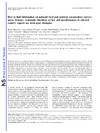Identificador persistente para citar o vincular este elemento:
https://accedacris.ulpgc.es/jspui/handle/10553/44756
| Campo DC | Valor | idioma |
|---|---|---|
| dc.contributor.author | Blanquer, Maria | en_US |
| dc.contributor.author | García-Álvarez, Alicia | en_US |
| dc.contributor.author | Ribas-Barba, Lourdes | en_US |
| dc.contributor.author | Wijnhoven, Trudy M.A. | en_US |
| dc.contributor.author | Tabacchi, Garden | en_US |
| dc.contributor.author | Gurinovic, Mirjana | en_US |
| dc.contributor.author | Serra-Majem, Lluís | en_US |
| dc.date.accessioned | 2018-11-22T02:16:49Z | - |
| dc.date.available | 2018-11-22T02:16:49Z | - |
| dc.date.issued | 2009 | en_US |
| dc.identifier.issn | 0007-1145 | en_US |
| dc.identifier.other | WoS | - |
| dc.identifier.uri | https://accedacris.ulpgc.es/handle/10553/44756 | - |
| dc.description.abstract | The present research was conducted within the framework of the EURopean micronutrient RECommendations Aligned project. In order to identify the best practice in assessing nutrient intakes, a search strategy for collecting data from national food consumption surveys/studies in Europe was developed. Systematic literature searches were carried out on twenty-eight European and the four European Free Trade Association countries. A questionnaire was also sent to two to five experts in each country. Systematic reviews using PubMed yielded 12703 abstracts that were reduced to 200 studies using inclusion and exclusion criteria. Similarly, a search of ministry web sites yielded 3033 hits, and subsequently reduced to nine surveys. Belgium, France, Germany, Ireland, Sweden, Spain and the United Kingdom were the countries with most data and Slovenia and Liechtenstein were those with the least. Seventy-eight expert questionnaires were obtained from all countries except for Liechtenstein, Luxembourg and Slovakia. Detailed results and references are given. A systematic search and questionnaires are equally good at identifying national surveys across countries. Literature searching provides globally accessible and objective information albeit limited, whereas the questionnaire provides information that, depending upon responders, can be more complete. A combination of both strategies is recommended. | en_US |
| dc.language | eng | en_US |
| dc.publisher | 0007-1145 | - |
| dc.relation.ispartof | British Journal of Nutrition | en_US |
| dc.source | British Journal Of Nutrition [ISSN 0007-1145], v. 101(S. 2), p. S37-S50, (Julio 2009) | en_US |
| dc.subject | 32 Ciencias médicas | en_US |
| dc.subject | 3206 Ciencias de la nutrición | en_US |
| dc.subject.other | Life-Style Factors | en_US |
| dc.subject.other | Elderly Rural-Population | en_US |
| dc.subject.other | Cross-Sectional Survey | en_US |
| dc.subject.other | Saturated Fatty-Acids | en_US |
| dc.subject.other | Swiss Health Survey | en_US |
| dc.subject.other | Dietary-Intake | en_US |
| dc.subject.other | Macronutrient Intake | en_US |
| dc.subject.other | Nutrition Survey | en_US |
| dc.subject.other | German Children | en_US |
| dc.subject.other | Irish Adults | en_US |
| dc.subject.other | National Nutrition Surveys | en_US |
| dc.subject.other | Search Methodology | en_US |
| dc.subject.other | European Projects | en_US |
| dc.subject.other | Best Practice | en_US |
| dc.title | How to find information on national food and nutrient consumption surveys across Europe: Systematic literature review and questionnaires to selected country experts are both good strategies | en_US |
| dc.type | info:eu-repo/semantics/article | en_US |
| dc.type | Article | en_US |
| dc.identifier.doi | 10.1017/S0007114509990572 | en_US |
| dc.identifier.scopus | 70149111273 | - |
| dc.identifier.isi | 000268650500007 | - |
| dc.contributor.authorscopusid | 35068949400 | - |
| dc.contributor.authorscopusid | 22978835400 | - |
| dc.contributor.authorscopusid | 6602967291 | - |
| dc.contributor.authorscopusid | 6506340178 | - |
| dc.contributor.authorscopusid | 6701544894 | - |
| dc.contributor.authorscopusid | 34871959300 | - |
| dc.contributor.authorscopusid | 35596972100 | - |
| dc.identifier.eissn | 1475-2662 | - |
| dc.description.lastpage | S50 | en_US |
| dc.description.firstpage | S37 | en_US |
| dc.relation.volume | 101 | en_US |
| dc.investigacion | Ciencias de la Salud | en_US |
| dc.type2 | Artículo | en_US |
| dc.contributor.daisngid | 8482634 | - |
| dc.contributor.daisngid | 2673309 | - |
| dc.contributor.daisngid | 1002891 | - |
| dc.contributor.daisngid | 1584011 | - |
| dc.contributor.daisngid | 1375278 | - |
| dc.contributor.daisngid | 676546 | - |
| dc.contributor.daisngid | 28836 | - |
| dc.description.numberofpages | 14 | en_US |
| dc.utils.revision | Sí | en_US |
| dc.contributor.wosstandard | WOS:Blanquer, M | - |
| dc.contributor.wosstandard | WOS:Garcia-Alvarez, A | - |
| dc.contributor.wosstandard | WOS:Ribas-Barba, L | - |
| dc.contributor.wosstandard | WOS:Wijnhoven, TMA | - |
| dc.contributor.wosstandard | WOS:Tabacchi, G | - |
| dc.contributor.wosstandard | WOS:Gurinovic, M | - |
| dc.contributor.wosstandard | WOS:Serra-Majem, L | - |
| dc.date.coverdate | Julio 2009 | en_US |
| dc.identifier.supplement | 2 | - |
| dc.identifier.ulpgc | Sí | en_US |
| dc.contributor.buulpgc | BU-MED | en_US |
| dc.description.jcr | 3,446 | |
| dc.description.jcrq | Q1 | |
| dc.description.scie | SCIE | |
| item.grantfulltext | open | - |
| item.fulltext | Con texto completo | - |
| crisitem.author.dept | GIR IUIBS: Nutrición | - |
| crisitem.author.dept | IU de Investigaciones Biomédicas y Sanitarias | - |
| crisitem.author.dept | Departamento de Ciencias Clínicas | - |
| crisitem.author.orcid | 0000-0002-9658-9061 | - |
| crisitem.author.parentorg | IU de Investigaciones Biomédicas y Sanitarias | - |
| crisitem.author.fullName | Serra Majem, Luis | - |
| Colección: | Artículos | |
Los elementos en ULPGC accedaCRIS están protegidos por derechos de autor con todos los derechos reservados, a menos que se indique lo contrario.
